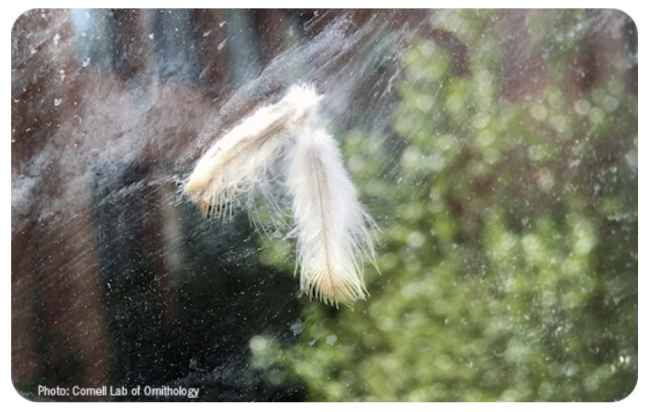
Help Prevent Window Strikes
Birds will strike a window for various reasons. They hit the window mostly when they are panicked or during territorial chases. Occasionally, a bird will not recognize a window and mistake the reflection of the sky or yard for safe passage. Birds that collide with glass while in free-flight are rarely just “stunned”, even if they are able to fly away after a period of recovery. Most suffer internal injuries and should be, if possible, examined by a licensed wildlife rehabber. The best cure is to make your windows bird-safe.
You can make your windows safer with one or more of the following steps
- Place bird feeding stations within three feet (1 meter) of the window or beyond ten feet (3 meters). Within three feet, birds ‘fleeing’ the feeder area will not have built up enough speed to injure themselves if they strike the window. Beyond ten feet, birds will have enough time to spot and avoid the window.
- Set up a window feeder. It will help increase the birds’ awareness of the window and provide you close views of them feeding.
- Window screens are a great solution. If your windows don’t have screens, there are some netting options you can purchase to install over your windows to keep birds from injuring themselves.
- Hanging vertical exterior strips across the window at 4 inch (10 cm) intervals can be a good deterrent; especially, if they are a reflective mylar ribbon or even paracord.
- Try films or other window applications that create contrast. Research indicates the key to effectiveness is having them close enough together; usually within 4 inches (10 cm) vertically and 2 inches (5 cm) horizontally.
- Interior vertical or horizontal blinds with the slats half-open may make the window more visible and cut down on some bird casualties. Go outside and look to see if it is visible. If you can’t see it, the birds can’t see it.
- Soaping the window or using spray-snow is a good temporary solution to deter collisions until you can install a more permanent solution
Go to the following site for more detailed information and solutions:
American Bird Conservancy, Stop Birds Hitting Windows page, https://abcbirds.org/get-involved/bird-smart-glass/
How you can help an injured bird?
Taking care of injured birds and wildlife should be left to people who know how to do it best. Contact Wild Birds Unlimited Savannah at 912.961.3455 for help locating a local rehabilitator. Or try this website to locate a rehabilitator, https://theiwrc.org/resources/emergency/north-america as well as The Humane Society websites for rehabilitators in the U.S. by state.
Window Attacks
Sometimes birds see their reflection in a window or even a car mirror and will attack the perceived intruder by pecking at the window or repeatedly dashing at the window. They are trying to chase the competitor out of their territory. This territorial behavior often happens during nesting season with cardinals, bluebirds, robins, mockingbirds, and other birds. You can deter the attacks by removing the reflection.
Because this is a seasonal behavior, it can be prevented with temporary measures such as covering the outside of the window with soap, newspaper, tempera paint, or a snow-type spray. Also, shining a bright light through the window from inside during the day may help eliminate any reflections on the outside.
What should you do if you find an orphaned bird?
The best thing to do if you find a baby bird is to leave it alone. If the bird appears as though it has fallen from a nest, an attempt to locate the nest can be made, and the bird can be carefully returned. If the bird has feathers, it may be a fledged bird and a parent bird is probably close by. As long as the bird is in no danger from cats or other predators, it is best to watch the bird from a distance to see if a parent returns after an hour or so before determining that the bird needs human help.
If a nest cannot be located or the bird is “rescued,” call a licensed wildlife rehabilitator to care for the bird as raising orphaned birds should be done by someone with specialized knowledge and a permit to have wild birds in captivity.
For more information about orphaned birds, visit our partner:
Orphaned Bird Care at www.orphanedbirdcare.com

